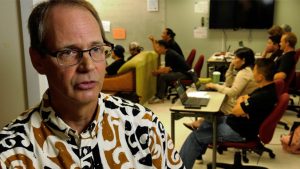In Hawaiʻi high schools, students who are college-bound take advanced placement (AP) classes in topics ranging from English to biology. The goal: to pass AP exams while in high school and be exempted from introductory coursework at the university level and reap possible scholarship money.
Now 14 teachers from nine public high schools on four islands are missing part of their summer vacation to be trained by University of Hawaiʻi personnel to teach the state’s newest AP class in the fall: computer science principles (CSP). UH secured the $1 million grant from the National Science Foundation’s STEM+C program for the Computer Science Principles for Hawaiʻi training, which ran June 18–22 at UH Mānoa.

“The more our students and our youth can learn these skills, they’re going to be transferable and applicable to their careers,” said Steve Auerbach, the director of Pacific Center for Advanced Technology Training at Honolulu Community College who serves as project co-investigator.
Educating more computer science savvy students will have the added benefit of increasing the pipeline of STEM and cyber-educated young people flowing into the workforce. Said Auerbach, “The more our students and youth can learn these skills, they’re going to be transferable and applicable to their careers.”
Auerbach said the soon-to-be AP–CSP teachers learned subjects such as programming, data sciences and cybersecurity. “They’re getting lesson plans, the curriculum, and they’re going to be very successful in taking the teaching back to their classroom environments.”
Thrilled to be one of the first teachers to get AP–CSP teacher training is ʻAiea High math teacher Alicia Nakamitsu. “I’m really excited to bring this back to our school and also to increase the diversity of professionals in computer science, to even out the girls and the boys, and the different ethnicities that are represented in the field,” said Nakamitsu. “And I just want to let students know that computer science is for everybody, because it touches everybody’s lives.”
Dodi Pritchett, a special education teacher at King Kekaulike High on Maui, said she and fellow teacher Loren Ayresman are also looking forward to leading the new AP–CSP class. Said Pritchett, “One of the goals that Loren and I have been brainstorming during this training is to collaborate together and really make the computer science course really accessible for all students, including those with special needs.”
Teachers in the first cohort:
- Oʻahu schools: Castle High – Dan Johnson; ʻAiea High – Ken Kang, Alicia Nakamitsu; Leilehua High – Brent Yamagata, Darren Kojima.
- Maui schools: King Kekaulike – Loren Ayersman, Dodi Pritchett; Maui High – Keith Imada; Lahainaluna High – Tad Luckey; Baldwin High – Casey Watanabe.
- Kauaʻi schools: Kapaʻa High – Liz Steiner, Richard Sypniewski; Martin Antonio.
- Hawaiʻi Island schools: Konawaena High – Paul Daugherty.
This first summer training of a planned three-year program benefits from a brain trust leadership involving multiple UH campuses. Principal investigator Debasis Bhattacharya is the program coordinator for applied business and information technology at UH Maui College. Co-investigators are Auerbach; Jodi Ito, UH chief information security officer; Gerald Lau, assistant faculty specialist at UH Mānoa’s information and computer sciences department in the College of Natural Sciences; and Debra Nakama, vice chancellor of student affairs at UH Maui College.
For more information, see Computer Science Principles for Hawaiʻi training website.

